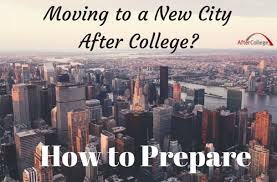Tiffany Franklin, Associate Director
 This time of year new graduates and students are moving all across the country and world to start new jobs, internships, graduate school, fellowships, and research positions. While this is an exciting time, it can be stressful and taking a little time to strategize can make a big difference in your experience. This topic is close to my heart since I’ve lived in a number of cities (Nashville, New Orleans, Atlanta, Jacksonville, FL, and Philadelphia) and have made big moves for both school and work. Here are a few things I learned that helped me make my new cities feel like home.
This time of year new graduates and students are moving all across the country and world to start new jobs, internships, graduate school, fellowships, and research positions. While this is an exciting time, it can be stressful and taking a little time to strategize can make a big difference in your experience. This topic is close to my heart since I’ve lived in a number of cities (Nashville, New Orleans, Atlanta, Jacksonville, FL, and Philadelphia) and have made big moves for both school and work. Here are a few things I learned that helped me make my new cities feel like home.
Preparing for the Move
There are a host of resources for you to read in the weeks leading up to your move to learn about your new city and all that it has to offer.
- Going Global – Includes a listing of cities in the US along with the country guides. Be sure to log-in via
http://www.vpul.upenn.edu/careerservices/library/ using your PennKey to access the site. Resources include a city overview, cost of living guide, networking resources, and a list of top companies.
- Chamber of Commerce sites – Check out the chamber of commerce for your new city for resources and a list of local attractions.
- Local Newspapers online
- City Search website
- City Scene or other magazine with listing of concerts, art exhibits, restaurants, etc.
- Local magazine – Philadelphia magazine for example
- Facebook/Twitter
- Alumni/Current Penn students from that city – Search QuakerNet, LinkedIn (Connections – Find Alumni sub tab) and the Penn Internship Network to find students and alumni in your new city.
- Penn Alumni Chapters
Housing
- Local Universities – Many med, law and business schools compile comprehensive guides for their incoming students that include a list of apartments, real estate agents, things to do, and info about the neighborhoods near the university. These can often be found with some creative Googling and are very helpful when deciding where to live.
- Referrals – Utilize your Penn network and connect with other Quakers who are living or have lived in your new city. Get their perspective on safe places to live, commute times, cultural amenities, and other factors that can shape your living experience.
- Research – Check out websites that offer rating for apartments (such as ApartmentRatings.com) and you can search by area crime rates as well.
First Weekend – Now what?
 It may seem daunting that first weekend in a new city when you don’t know many people, but look at it like you did freshman year and stay open to meeting people. Strike up a conversation with someone at the coffee shop or next to you in yoga class. Try a new interest through classes or meetup groups (cooking, art, exercise, professional groups). Visit local parks and look into activities like sports leagues or volunteer opportunities with a cause that is close to your heart. Before long, you will have a whole new social circle and many things to fill your free time.
It may seem daunting that first weekend in a new city when you don’t know many people, but look at it like you did freshman year and stay open to meeting people. Strike up a conversation with someone at the coffee shop or next to you in yoga class. Try a new interest through classes or meetup groups (cooking, art, exercise, professional groups). Visit local parks and look into activities like sports leagues or volunteer opportunities with a cause that is close to your heart. Before long, you will have a whole new social circle and many things to fill your free time.
Colleagues or Friends?
Always remember to be professional in your internship or new job. You may start with a group of people, so you will have some built in work contacts. If not, offer to take a colleague to lunch or coffee. If you have finished your assignments, offer to help someone. Listen and be genuinely interested in people.
Give it some Time
Acclimating to a new city is both an exciting and sometimes scary process. It may take you a few weeks or months to get into a new routine, but it will happen. Keep in mind that your social calendar requires more planning in the beginning. It’s okay to do some things on your own and be sure to diversify your group of friends, so you are not counting on one person to be your social life. If you feel a little lonely in the beginning, remember your friends and family are just a text, call, Skype, or email away.
Enjoy the Adventure
Moving can be an amazing adventure and can provide you with a number of stories. If you are not loving your new city, keep in mind it doesn’t have to be permanent and you can move again. But first, give it a year and your new city may turn into your new home. Have fun making friends and embracing the new experiences.




